Top Rated Virginia Traffic Lawyer VA Attorney • 1500+ Reviews
 Virginia is frequently recognized as a state with strict traffic laws. Traffic violations such as DUI / DWI, reckless driving, and speeding are among the more popularly enforced laws. Virginia traffic violations are first classified into either the criminal offense category or the traffic infraction category. Criminal traffic violations can either be a felony or a misdemeanor. Traffic infraction violations can either be a demerit point offense or a no demerit point non-moving violation. State Troopers & Local Police aggressively enforce the traffic laws. Penalties can range from a small fine to incarceration depending on the seriousness of the offense and the facts of the case.
Virginia is frequently recognized as a state with strict traffic laws. Traffic violations such as DUI / DWI, reckless driving, and speeding are among the more popularly enforced laws. Virginia traffic violations are first classified into either the criminal offense category or the traffic infraction category. Criminal traffic violations can either be a felony or a misdemeanor. Traffic infraction violations can either be a demerit point offense or a no demerit point non-moving violation. State Troopers & Local Police aggressively enforce the traffic laws. Penalties can range from a small fine to incarceration depending on the seriousness of the offense and the facts of the case.
***Our traffic lawyers are licensed to practice law in all Virginia Courts***
30,000+ Clients Represented
1500+ Client Reviews
60+ Years of Combined Experience
Experienced Traffic Ticket Attorney in Virginia
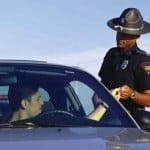 Riley & Wells Attorneys-At-Law are Virginia traffic ticket lawyers specializing in defending traffic violation cases. We have been favorably rated more than any other Virginia law firm that defends traffic violation case. Our traffic lawyers possess over 60 years of combined traffic law experience. Our law firm is dedicated to defending traffic violations. Our VA traffic lawyers have been recognized as a “Best Law Firm” by U.S. News & World Report. Our law firm is rated “AV Preeminent” by Martindale-Hubbell for the highest ethical standards and legal excellence. CAUTION: A Virginia traffic violation conviction may increase the automobile insurance premium by as much as 79% depending on the offense, according to Insurance.com
Riley & Wells Attorneys-At-Law are Virginia traffic ticket lawyers specializing in defending traffic violation cases. We have been favorably rated more than any other Virginia law firm that defends traffic violation case. Our traffic lawyers possess over 60 years of combined traffic law experience. Our law firm is dedicated to defending traffic violations. Our VA traffic lawyers have been recognized as a “Best Law Firm” by U.S. News & World Report. Our law firm is rated “AV Preeminent” by Martindale-Hubbell for the highest ethical standards and legal excellence. CAUTION: A Virginia traffic violation conviction may increase the automobile insurance premium by as much as 79% depending on the offense, according to Insurance.com
Traffic Lawyer VA Client Reviews
Virginia Attorneys Specializing in Traffic Law Defense
 Consult a Virginia Traffic Lawyer before you plead guilty to any traffic ticket. Some motorists do not understand the seriousness of the allegation. For example, driving 86 mph in a 70 mph zone is a criminal misdemeanor reckless driving violation. So is failing to “move over” for a stationary emergency vehicle. We have represented over 30,000 clients before the Virginia Courts.
Consult a Virginia Traffic Lawyer before you plead guilty to any traffic ticket. Some motorists do not understand the seriousness of the allegation. For example, driving 86 mph in a 70 mph zone is a criminal misdemeanor reckless driving violation. So is failing to “move over” for a stationary emergency vehicle. We have represented over 30,000 clients before the Virginia Courts.
Free Consultation with Top Rated VA Traffic Lawyers
 Some folks think they do not need a Virginia traffic lawyer for their traffic violation case. The answer often depends on the seriousness of the offense and the individual driver’s circumstances. The biggest issues with representing yourself in traffic court is often the lack of experience and legal knowledge. The average person typically does not understand the best course of action to defend a particular Virginia traffic violation case. Top rated Virginia traffic attorneys know the best tactics and options for obtaining the best results. Our lawyers spend hours in the Virginia Courts every week and are familiar with the habits of the different judges and the law enforcement officers who enforce the traffic laws.
Some folks think they do not need a Virginia traffic lawyer for their traffic violation case. The answer often depends on the seriousness of the offense and the individual driver’s circumstances. The biggest issues with representing yourself in traffic court is often the lack of experience and legal knowledge. The average person typically does not understand the best course of action to defend a particular Virginia traffic violation case. Top rated Virginia traffic attorneys know the best tactics and options for obtaining the best results. Our lawyers spend hours in the Virginia Courts every week and are familiar with the habits of the different judges and the law enforcement officers who enforce the traffic laws.
Virginia Uniform Summons Traffic Ticket Issued by VA Police
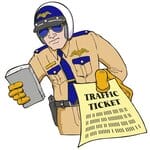 A Virginia Uniform Summons is the legal document issued by Virginia law enforcement officers during a traffic stop. Motorists often refer to this document as either a traffic ticket or citation. The summons serves as legal notice for the alleged traffic violation. Signing the summons is not an admission of guilt. The summons advises you that a hearing will be at a particular Courthouse on a particular date and time. A law enforcement can also issue a summons for criminal offenses such as reckless driving and other misdemeanor offenses. Allow us to review your summons. We can develop a defense strategy even if you think you are guilty.
A Virginia Uniform Summons is the legal document issued by Virginia law enforcement officers during a traffic stop. Motorists often refer to this document as either a traffic ticket or citation. The summons serves as legal notice for the alleged traffic violation. Signing the summons is not an admission of guilt. The summons advises you that a hearing will be at a particular Courthouse on a particular date and time. A law enforcement can also issue a summons for criminal offenses such as reckless driving and other misdemeanor offenses. Allow us to review your summons. We can develop a defense strategy even if you think you are guilty.
Virginia Interstate Traffic Law Defense Attorneys
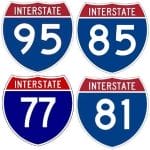 Virginia State Troopers, County Deputy Sheriffs & local police strictly enforce the VA traffic laws on Virginia’s interstates. Virginia Interstates total 1,118 miles. Primary highways total 8111 miles and consist of U.S. Routes and primary state routes. Virginia has 48,305 miles of secondary routes. Driving in violation of the Virginia traffic laws for too long on a Virginia interstate or highway will likely get noticed by law enforcement. Do NOT plead guilty without consulting a top rated Virginia traffic lawyer who specializing in defending Virginia traffic violation cases. We know how to best defend your case. Allow us to review your case. We can help!
Virginia State Troopers, County Deputy Sheriffs & local police strictly enforce the VA traffic laws on Virginia’s interstates. Virginia Interstates total 1,118 miles. Primary highways total 8111 miles and consist of U.S. Routes and primary state routes. Virginia has 48,305 miles of secondary routes. Driving in violation of the Virginia traffic laws for too long on a Virginia interstate or highway will likely get noticed by law enforcement. Do NOT plead guilty without consulting a top rated Virginia traffic lawyer who specializing in defending Virginia traffic violation cases. We know how to best defend your case. Allow us to review your case. We can help!
Traffic Law Attorneys For Virginia Cases
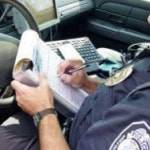 Felony traffic offenses include eluding the police, leaving the scene of an accident, and third or subsequent offense driving under the influence. A felony traffic violation can trigger a prison sentence if convicted. NOTE: Do not plead guilty without consulting a lawyer. Do not attempt to represent yourself without at least first consulting a traffic lawyer. We provide free no obligation initial consultations.
Felony traffic offenses include eluding the police, leaving the scene of an accident, and third or subsequent offense driving under the influence. A felony traffic violation can trigger a prison sentence if convicted. NOTE: Do not plead guilty without consulting a lawyer. Do not attempt to represent yourself without at least first consulting a traffic lawyer. We provide free no obligation initial consultations.
Out-of-State Drivers convicted of Virginia Traffic Violations
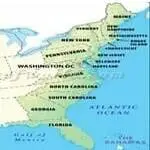 Many of the motorists who use Virginia interstates and highways are licensed to drive in other states. Just because you may be from another state does not mean you can ignore your Virginia traffic violation case. Out-of-state drivers must defend their Virginia traffic case because a conviction will be reported back to the home state. The home state and automobile insurance company may then take action against the driver. Our VA traffic lawyers represent clients from other states every week. In many instances, we can make a motion to waive our client’s appearance so that our client does not have to return to Virginia for the trial.
Many of the motorists who use Virginia interstates and highways are licensed to drive in other states. Just because you may be from another state does not mean you can ignore your Virginia traffic violation case. Out-of-state drivers must defend their Virginia traffic case because a conviction will be reported back to the home state. The home state and automobile insurance company may then take action against the driver. Our VA traffic lawyers represent clients from other states every week. In many instances, we can make a motion to waive our client’s appearance so that our client does not have to return to Virginia for the trial.
Riley & Wells Attorneys-At-Law Defend Virginia Traffic Violations
-
Habitual Offender
- DUI / DWI
-
Eluding the Police
-
Hit & Run-Leaving the Scene of an Accident
-
Driving Without a Valid License
-
Driving on a Suspended or Revoked License
-
Commercial Driver Violations
- Aggressive Driving
-
Restoration of Driving Privileges
- Reckless Driving
- Handheld Cellphone Use while Driving
-
Out Of State Drivers
- Failure to “Move Over” or Yield to Stationary Emergency Vehicle
-
Accidents
-
Moving Violations
- Toll Violations
-
Driving Without Automobile Insurance
Virginia Traffic Lawyer Handheld Cellphone While Driving Defense
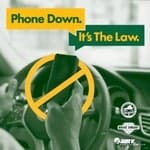 Virginia is a Hands Free Driving State. Va. Code §46.2-818.2 prohibits having a phone or handheld personal communication device in your hand while driving. Virginia law enforcement officer do not need to obtain evidence that you were doing anything in particular on the phone or device like texting while driving to prove a violation. This offense is a moving violation demerit point offense. A conviction will post to the driving record. However, there are exceptions. The hands free law does not apply to drivers who are lawfully parked or stopped, drivers reporting emergencies, and drivers using an amateur or citizens band radio. Allow our top rated Virginia traffic lawyers to review your case!
Virginia is a Hands Free Driving State. Va. Code §46.2-818.2 prohibits having a phone or handheld personal communication device in your hand while driving. Virginia law enforcement officer do not need to obtain evidence that you were doing anything in particular on the phone or device like texting while driving to prove a violation. This offense is a moving violation demerit point offense. A conviction will post to the driving record. However, there are exceptions. The hands free law does not apply to drivers who are lawfully parked or stopped, drivers reporting emergencies, and drivers using an amateur or citizens band radio. Allow our top rated Virginia traffic lawyers to review your case!
Consequences of a Virginia Traffic Violation Conviction
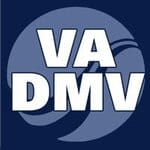 There are at least three areas where a motorist can be penalized for a traffic law conviction. First, the Virginia Courts can impose various penalties for a traffic violation conviction. Such penalties may include incarceration, loss of driving privileges, fines, and court costs. Second, the Department of Motor Vehicles can also impose penalties. These penalties may include loss of driving privileges, moving violation demerit points, and other fees. Automobile insurance policy premiums and deductibles will likely increase. There may even be employment consequences depending on the type of offense and employer guidelines. Contact our experienced traffic lawyers for a free no obligation initial consultation.
There are at least three areas where a motorist can be penalized for a traffic law conviction. First, the Virginia Courts can impose various penalties for a traffic violation conviction. Such penalties may include incarceration, loss of driving privileges, fines, and court costs. Second, the Department of Motor Vehicles can also impose penalties. These penalties may include loss of driving privileges, moving violation demerit points, and other fees. Automobile insurance policy premiums and deductibles will likely increase. There may even be employment consequences depending on the type of offense and employer guidelines. Contact our experienced traffic lawyers for a free no obligation initial consultation.
Virginia DMV Point System Explained By Top Rated Traffic Lawyer
 The Virginia DMV has a system of demerit points and safe driving points that are used to track driver behavior. Demerit points are assigned for moving violations and the number of points depends on the seriousness of the violation. Demerit points are valid for two years from the date of the offense. Safe driving points are awarded for each year a driver holds a valid license and has no violations or suspensions. Drivers can earn up to a maximum of five safe driving points. Drivers who accumulate 12 demerit points in 12 months or 18 demerit points in 24 months are placed on probation. If a driver receives a ticket while on probation will be suspended.
The Virginia DMV has a system of demerit points and safe driving points that are used to track driver behavior. Demerit points are assigned for moving violations and the number of points depends on the seriousness of the violation. Demerit points are valid for two years from the date of the offense. Safe driving points are awarded for each year a driver holds a valid license and has no violations or suspensions. Drivers can earn up to a maximum of five safe driving points. Drivers who accumulate 12 demerit points in 12 months or 18 demerit points in 24 months are placed on probation. If a driver receives a ticket while on probation will be suspended.
Six Point Violations
- Reckless driving
- Speeding 20 mph or more above the posted speed limit
- Driving while intoxicated or under the influence of alcohol or drugs
- Driving after illegally consuming alcohol (persons under age 21)
- Refusing blood/breath test
- Driving while your license is suspended or revoked
- Failure to stop at the scene of a crash/Hit and run
- Attempting to elude police
- Injuring person while racing – felony
- Blocking access to service facility
- Driving after being declared a habitual offender
- Authorizing person suspended for habitual offender and/or driving while intoxicated to drive
- Manslaughter/Involuntary manslaughter
Four Point Violations
- Speeding 10-19 mph above the posted speed limit
- Passing when unsafe
- Passing to the left of approaching vehicle
- Failure to drive to the right and stop for police/fire/emergency vehicle
- Failure to stop for pedestrian
- Failure to stop and yield right-of-way
- Failure to yield right-of-way
- Failure to yield when turning left
- Failure to yield to funeral procession
- Failure to drive on right half of highway or street
- Failure to keep to the right when crossing an intersection
- Driving to the left of rotary traffic island
- Following too closely
- Failure to signal before moving from curb
- Improper signal
- Failure to obey railroad crossing signal
- Failure to stop at railroad grade crossing
- Failure to keep to the right at a railroad crossing
- Failure to stop passenger-carrying vehicle at railroad grade crossing
- Operating a motor vehicle while suspended/revoked/restricted with a blood alcohol content of .02% or more
- Failure to stop at the scene of a crash – unattended property damage in excess of $500
- Passing stopped school bus (non-reckless)
- Failure to stop at the scene of a crash – property damage only
- Aggressive driving
- Failure to obey traffic signal
- Failure to obey lane directional signal
- Failure to obey highway lane markings
- Improper backing, stopping or turning
- Driving the wrong way on one-way highway or street
- Impeding/disrupting funeral procession
- Disregarding police officer’s signal to stop
- Disregarding crossing guard/officer’s signal
Three Point Violations
- Speeding 1-9 mph above the posted speed limit
- Impeding traffic, slow speed
- Improper passing
- Improper passing on the right
- Improper driving
- Improper stopping on highway
- Changing course after signaling
- Coasting with gears in neutral
- Failure to give way in favor of overtaking vehicle
- Failure to give way when abreast of another car
- Driving through safety zone
- Driving over fire hose
- Unauthorized use of crossover on controlled highway
- Driving/riding on sidewalk
- Improper turn
- Improper U-turn
- Violation of right turn on red
- Violation of left turn on red
- Failure to obey highway sign
- Evading traffic control device
- Driving without lights/excessive lights
- Failure to dim headlights
- Parking without proper lights displayed
- Inadequate hazard lights
- No Virginia driver’s license
- No Virginia license plate
- Failure to obtain a driver’s license
- No driver’s license – vehicle/motorcycle
- Failure to have license revalidated
- Learner’s permit violation
- Permitting unlicensed person to drive
- Driving in violation of restricted license (restrictions related to physical limitation, such as mechanical control device)
- Failure to stop at the scene of a crash – unattended property
- Failure to leave the scene of a crash at the direction of officer
- Failure to report a crash – unattended property less than $250 damage
- Following/parking within 500 feet of fire apparatus
- Drinking while driving
- Improper driving/riding motorcycle
- Driving with TV screen visible to driver
- Driving while using earphones
- Passenger restriction violation
- Curfew violation
- HOV violation, second or subsequent offense
- Use of handheld communications device
Traffic Law Enforcement is Aggressive in VA Small Cities and Towns
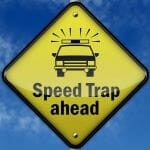 Virginia law enforcement statistics are frequently reported by the media. Many of these statistics are the result of speed traps. A speed trap is an area of the road where police officers hide in order to detect vehicles violating the speed limit. A few Virginia small cities and towns are particularly aggressive with enforcing the traffic laws according to a study conducted by Governing Magazine. Eight VA localities made the cut: Brunswick, Greensville, Gordonsville, Eastville, Emporia, LaCrosse, Sussex, & Waverly. But it was Northampton County’s Town of Eastville taking the top spot by relying on traffic fines more than any other locality. We can help. Consult with a top rated traffic lawyer even if you think you are guilty.
Virginia law enforcement statistics are frequently reported by the media. Many of these statistics are the result of speed traps. A speed trap is an area of the road where police officers hide in order to detect vehicles violating the speed limit. A few Virginia small cities and towns are particularly aggressive with enforcing the traffic laws according to a study conducted by Governing Magazine. Eight VA localities made the cut: Brunswick, Greensville, Gordonsville, Eastville, Emporia, LaCrosse, Sussex, & Waverly. But it was Northampton County’s Town of Eastville taking the top spot by relying on traffic fines more than any other locality. We can help. Consult with a top rated traffic lawyer even if you think you are guilty.
Driver Improvement Program For Virginia Traffic Cases
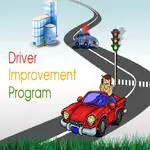 A Driver Improvement Program or Traffic School is an educational course designed to improve the knowledge and driving skills of participants. One of the main purposes of a Driver Improvement Program is to provide a pathway for our traffic court clients to mitigate the consequences of their Virginia traffic ticket case. Completing a program may assist our top rated VA traffic lawyers in convincing the Virginia Judge to dismiss or reduce the case. The duration of the Program can either be a 12 hour or an 8 hour course. The program has in person and online formats. Consult our experienced Virginia traffic lawyers to understand your options before you pursue a driver improvement program for your traffic case.
A Driver Improvement Program or Traffic School is an educational course designed to improve the knowledge and driving skills of participants. One of the main purposes of a Driver Improvement Program is to provide a pathway for our traffic court clients to mitigate the consequences of their Virginia traffic ticket case. Completing a program may assist our top rated VA traffic lawyers in convincing the Virginia Judge to dismiss or reduce the case. The duration of the Program can either be a 12 hour or an 8 hour course. The program has in person and online formats. Consult our experienced Virginia traffic lawyers to understand your options before you pursue a driver improvement program for your traffic case.
Virginia Courts Are Adversarial • Retain a Top Traffic Lawyer
 If you have been accused of violating a Virginia traffic law, then your case will eventually be set for trial before a Virginia District Court. Traffic violation trials are adversarial in nature. This involves a structured and formalized dispute between the Commonwealth Attorney’s Office and the defense. The adversarial system is designed to ensure a fair trial process subject to the rules of law and evidence by allowing each side to present their case and to be able to challenge the other’s arguments and evidence. The District Court Judge ultimately evaluates the evidence, arguments, and the credibility of witnesses to reach a verdict. This system ensures that the prosecution meets its high standard of proof.
If you have been accused of violating a Virginia traffic law, then your case will eventually be set for trial before a Virginia District Court. Traffic violation trials are adversarial in nature. This involves a structured and formalized dispute between the Commonwealth Attorney’s Office and the defense. The adversarial system is designed to ensure a fair trial process subject to the rules of law and evidence by allowing each side to present their case and to be able to challenge the other’s arguments and evidence. The District Court Judge ultimately evaluates the evidence, arguments, and the credibility of witnesses to reach a verdict. This system ensures that the prosecution meets its high standard of proof.
Frequently Enforced Virginia Traffic Laws
Va Code § 46.2-300 No valid driver’s license; driving without license prohibited; penalties.
No person, except those expressly exempted in §§ 46.2-303 through 46.2-308, shall drive any motor vehicle on any Virginia highway in the Commonwealth until such person has applied for a driver’s license, as provided in this article, satisfactorily passed the examination required by § 46.2-325, and obtained a driver’s license, nor unless the license is valid.
A violation of this section is a Class 2 misdemeanor. A second or subsequent violation of this section is a Class 1 misdemeanor.
Upon conviction under this section, the court may suspend the person’s privilege to drive for a period not to exceed 90 days.
A Virginia traffic lawyer can help you if you have been accused of this offense. There may be defenses to your case even if you think you are guilty. Contact a top rated VA traffic attorney. Your case may be more serious than you think.
Va Code § 46.2-301 Driving on a suspended driver’s license; driving while license, permit, or privilege to drive suspended or revoked.
A. In addition to any other penalty provided by this section, any motor vehicle administratively impounded or immobilized under the provisions of § 46.2-301.1 may, in the discretion of the court, be impounded or immobilized for an additional period of up to 90 days upon conviction of an offender for driving while his driver’s license, learner’s permit, or privilege to drive a motor vehicle has been (i) suspended or revoked for a violation of § 18.2-36.1, 18.2-51.4, 18.2-266, 18.2-272, or 46.2-341.24 or a substantially similar ordinance or law in any other jurisdiction or (ii) administratively suspended under the provisions of § 46.2-391.2.
However, if, at the time of the violation, the offender was driving a motor vehicle owned by another person, the court shall have no jurisdiction over such motor vehicle but may order the impoundment or immobilization of a motor vehicle owned solely by the offender at the time of arrest. All costs of impoundment or immobilization, including removal or storage expenses, shall be paid by the offender prior to the release of his motor vehicle.
B. Except as provided in § 46.2-304, no resident or nonresident (i) whose driver’s license, learner’s permit, or privilege to drive a motor vehicle has been suspended or revoked or (ii) who has been directed not to drive by any court or by the Commissioner, or (iii) who has been forbidden, as prescribed by operation of any statute of the Commonwealth or a substantially similar ordinance of any county, city or town, to operate a motor vehicle in the Commonwealth shall thereafter drive any motor vehicle or any self-propelled machinery or equipment on any Virginia highway until the period of such suspension or revocation has terminated or the privilege has been reinstated or a restricted license is issued.
For the purposes of this section, the phrase “motor vehicle or any self-propelled machinery or equipment” shall not include mopeds.
C. A violation of subsection B is a Class 1 misdemeanor.
D. Upon a violation of subsection B, the court shall suspend the person’s license or privilege to drive a motor vehicle for the same period for which it had been previously suspended or revoked. In the event the person violated subsection B by driving during a period of suspension or revocation which was not for a definite period of time, the court shall suspend the person’s license, permit or privilege to drive for an additional period not to exceed 90 days, to commence upon the expiration of the previous suspension or revocation or to commence immediately if the previous suspension or revocation has expired.
However, no such suspension shall extend beyond 10 years from the conviction date for such violation of subsection B, unless required by Article 6.1 (§ 46.2-341.1 et seq.).
E. Any person who is otherwise eligible for a restricted license may petition each court that suspended his license pursuant to subsection D for authorization for a restricted license, provided that the period of time for which the license was suspended by the court pursuant to subsection D, if measured from the date of conviction, has expired, even though the suspension itself has not expired. A court may, for good cause shown, authorize the DMV to issue a restricted license for any of the purposes set forth in subsection E of § 18.2-271.1.
No restricted license shall be issued unless each court that issued a suspension of the person’s license pursuant to subsection D authorizes the Department to issue a restricted license.
Any restricted license issued pursuant to this subsection shall be in effect until the expiration of any and all suspensions issued pursuant to subsection D, except that it shall automatically terminate upon the expiration, cancellation, suspension, or revocation of the person’s license or privilege to drive for any other cause.
No restricted license issued pursuant to this subsection shall permit a person to operate a commercial motor vehicle as defined in the Commercial Driver’s License Act (§ 46.2-341.1 et seq.). The court shall forward to the Commissioner a copy of its authorization entered pursuant to this subsection, which shall specifically enumerate the restrictions imposed and contain such information regarding the person to whom such a license is issued as is reasonably necessary to identify the person. The court shall also provide a copy of its authorization to the person, who may not operate a motor vehicle until receipt from the Commissioner of a restricted license.
A copy of the restricted license issued by the Commissioner shall be carried at all times while operating a motor vehicle.
F. Any person who operates a motor vehicle or any self-propelled machinery or equipment in violation of the terms of a restricted license issued pursuant to subsection E of § 18.2-271.1 is not guilty of a violation of this section but is guilty of a violation of § 18.2-272.
Driving on a suspended driver’s license is a serious traffic violation in Virginia. The jail penalty is real if convicted of this offense. Furthermore, a conviction will result in further loss of driving privileges. Consult a top rated Virginia traffic lawyer about your case.
Va Code § 46.2-646 Expired vehicle registration
A. Every registration under this title, unless otherwise provided, shall expire on the last day of the twelfth month next succeeding the date of registration. Every registration, unless otherwise provided, shall be renewed annually on application by the owner and by payment of the fees required by law, the renewal to take effect on the first day of the month succeeding the date of expiration. Notwithstanding these limitations, the Commissioner may extend the validity period of an expiring registration if (i) the Department is unable to process an application for renewal due to circumstances beyond its control, and (ii) the extension has been authorized under a directive from the Governor.
However, in no event shall the validity period be extended more than 90 days per occurrence of such conditions.
B. All motor vehicles, trailers, and semitrailers registered in the Commonwealth shall, at the discretion of the Commissioner, be placed in a system of registration on a monthly basis to distribute the work of registering motor vehicles as uniformly as practicable throughout the 12 months of the year. All such motor vehicles, trailers, and semitrailers, unless otherwise provided, shall be registered for a period of 12 months. The registration shall be extended, at the discretion of the Commissioner, on receipt of appropriate prorated fees, as required by law, for a period of not less than one month nor more than 11 months as is necessary to distribute the registrations as equally as practicable on a monthly basis.
The Commissioner shall, on request, assign to any owner or owners of two or more motor vehicles, trailers, or semitrailers the same registration period. The expiration date shall be the last day of the twelfth month or the last day of the designated month. Except for motor vehicles, trailers, and semitrailers registered for more than one year under subsection C of this section, every registration shall be renewed annually on application by the owner and by payment of fees required by law, the renewal to take effect on the first day of the succeeding month.
C. The Commissioner may offer, at his discretion, an optional multi-year registration for all motor vehicles, trailers, and semitrailers except for those registered under the International Registration Plan. When this option is offered and chosen by the registrant, all annual and 12-month fees due at the time of registration shall be multiplied by the number of years or fraction thereof that the vehicle will be registered.
D. For any summons issued for a violation of this section, the court may, in its discretion, dismiss the summons where proof of compliance with this section is provided to the court on or before the court date.
E. No law-enforcement officer shall stop a motor vehicle due to an expired registration sticker prior to the first day of the fourth month after the original expiration date. No evidence discovered or obtained as the result of a stop in violation of this subsection, including evidence discovered or obtained with the operator’s consent, shall be admissible in any trial, hearing, or other proceeding.
Driving with expired vehicle registration is a non-moving no demerit points traffic infraction. Exceptions to this can be when the allegation involves fictitious usage of license plates. Consult a top rated Virginia traffic lawyer to make sure you case is not more serious than you think. Additionally, we may be able to present evidence to convince the Judge to order that you have complied with the law and to dismiss the case even if you are in violation. Our VA traffic attorneys offer a free no obligation consultation.
Va Code § 46.2-802 Drive on right side of highways; penalty.
Except as otherwise provided by law, on all Virginia highways of sufficient width, the driver of a vehicle shall drive on the right half of the highway, unless it is impracticable to travel on such side of the highway and except when overtaking and passing another vehicle, subject to the provisions applicable to overtaking and passing set forth in Article 4 (§ 46.2-837 et seq.) of this chapter. A violation of this section is punishable by a fine of $100.
Our VA traffic lawyers typically see this offense when an accident may be involved. On its face, this is not a serious offense but being convicted of a traffic violation that results in a traffic crash may create issues for the automobile insurance policy. Allow our top rated Virginia traffic lawyers to review your case.
Va Code § 46.2-804 Unsafe lane change; failure to observe lanes marked for traffic; penalty.
For the purposes of this section, “traffic lines” includes any temporary traffic control devices used to emulate the lines and markings in subdivisions 6 and 7.
Whenever any Virginia roadway has been divided into clearly marked lanes for traffic, drivers of vehicles shall obey the following:
1. Any vehicle proceeding at less than the normal speed of traffic at the time and place and under the conditions existing, shall be driven in the lane nearest the right edge or right curb of the highway when such lane is available for travel except when overtaking and passing another vehicle or in preparation for a left turn or where right lanes are reserved for slow-moving traffic as permitted in this section;
2. A vehicle shall be driven as nearly as is practicable entirely within a single lane and shall not be moved from that lane until the driver has ascertained that such movement can be made safely;
3. Except as otherwise provided in subdivision 5, on a Virginia highway which is divided into three lanes, no vehicle shall be driven in the center lane except when overtaking and passing another vehicle or in preparation for a left turn or unless such center lane is at the time allocated exclusively to traffic moving in the direction the vehicle is proceeding and is signed or marked to give notice of such allocation.
Traffic-control devices may be erected directing specified traffic to use a designated lane or designating those lanes to be used by traffic moving in a particular direction regardless of the center of the roadway and drivers of vehicles shall obey the directions of every such device;
4. The Commissioner of Highways, or local authorities in their respective jurisdictions, may designate right lanes for slow-moving vehicles and the Virginia Department of Transportation shall post signs requiring trucks and combination vehicles to keep to the right on Interstate Highway System components with no more than two travel lanes in each direction where terrain is likely to slow the speed of such vehicles climbing hills and inclines to a speed that is less than the posted speed limit;
5. Wherever a Virginia highway is marked with double traffic lines consisting of a solid line immediately adjacent to a broken line, no vehicle shall be driven to the left of such line if the solid line is on the right of the broken line, except (i) when turning left for the purpose of entering or leaving a public, private, or commercial road or entrance or (ii) in order to pass a pedestrian or a device moved by human power, including a bicycle, skateboard, or foot-scooter, provided such movement can be made safely.
Where the middle lane of a Virginia highway is marked on both sides with a solid line immediately adjacent to a broken line, such middle lane shall be considered a left-turn or holding lane and it shall be lawful to drive to the left of such line if the solid line is on the right of the broken line for the purpose of turning left into any road or entrance, provided that the vehicle may not travel in such lane further than 150 feet;
6. Wherever a Virginia highway is marked with double traffic lines consisting of two immediately adjacent solid yellow lines, no vehicle shall be driven to the left of such lines, except (i) when turning left or (ii) in order to pass a pedestrian or a device moved by human power, including a bicycle, skateboard, or foot-scooter, provided such movement can be made safely; and
7. Whenever a highway is marked with double traffic lines consisting of two immediately adjacent solid white lines, no vehicle shall cross such lines.
A violation of this section is punishable by a fine of $100.
Another popular Virginia traffic violation for law enforcement investigating crash cases or accidents. This is a minor moving violation demerit point traffic infraction but a conviction can negatively affect the automobile policy. Our top rated Virginia traffic lawyers specialize in defending theses cases. Let us review your case.
Va Code § 46.2-816 Following too closely
The driver of a motor vehicle shall not follow another vehicle, trailer, or semitrailer more closely than is reasonable and prudent, having due regard to the speed of both vehicles and the traffic on, and conditions of, the Virginia highway at the time.
A following too close Virginia traffic ticket is often the result of a rear end accident. The police officer issuing a Virginia Uniform Summons for following too close is not an automatic conviction. There may be defenses you are not aware of even if you think you are guilty. An experienced VA traffic lawyer that knows how to present the best defense can help. Call us!
Va Code § 46.2-817 Eluding police; disregarding signal by law-enforcement officer to stop; penalties.
A. Any person who, having received a visible or audible signal from any Virginia law-enforcement officer to bring his motor vehicle to a stop, drives such motor vehicle in a willful and wanton disregard of such signal or who attempts to escape or elude such law-enforcement officer whether on foot, in the vehicle, or by any other means, is guilty of a Class 2 misdemeanor. It shall be an affirmative defense to a charge of a violation of this subsection if the defendant shows he reasonably believed he was being pursued by a person other than a law-enforcement officer.
B. Any person who, having received a visible or audible signal from any Virginia law-enforcement officer to bring his motor vehicle to a stop, drives such motor vehicle in a willful and wanton disregard of such signal so as to interfere with or endanger the operation of the law-enforcement vehicle or endanger a person is guilty of a Class 6 felony. It shall be an affirmative defense to a charge of a violation of this subsection if the defendant shows he reasonably believed he was being pursued by a person other than a law-enforcement officer.
C. If a Virginia law-enforcement officer pursues a person as a result of a violation of subsection B and the law-enforcement officer is killed as a direct and proximate result of the pursuit, the person who violated subsection B is guilty of a Class 4 felony.
D. When any person is convicted of an offense under this section, in addition to the other penalties provided in this section, the driver’s license of such person shall be suspended by the court for a period of not less than thirty days nor more than one year. However, in any case where the speed of such person is determined to have exceeded the maximum allowed by twenty miles per hour, his driver’s license shall be suspended by the court trying the case for a period of not less than ninety days.
In case of conviction and suspension, the court or judge shall order the surrender of the license to the court, which shall dispose of it in accordance with the provisions of § 46.2-398.
E. Violation of this section shall constitute a separate and distinct offense. If the acts or activities violating this section also violate another provision of law, a prosecution under this section shall not prohibit or bar any prosecution or proceeding under such other provision or the imposition of any penalties provided for thereby.
Eluding the police or attempting to elude police is a serious traffic violation. This offense can be either a misdemeanor or a felony. The difference will usually be determined if there is evidence of endangerment. Only a skilled Virginia traffic lawyer who specializes in traffic defense can properly defense these types of cases. Our VA traffic attorneys successfully defend this type of Virginia traffic violation.
Va Code § 46.2-818.2 Hold cellphone while driving; use of handheld personal communications devices in certain motor vehicles; exceptions; penalty.
A. It is unlawful for any person, while driving a moving motor vehicle on a Virginia highway, to hold a handheld personal communications device.
B. The provisions of this section shall not apply to:
1. The operator of any emergency vehicle while he is engaged in the performance of his official duties;
2. An operator who is lawfully parked or stopped;
3. Any person using a handheld personal communications device to report an emergency;
4. The use of an amateur or a citizens band radio; or
5. The operator of any Department of Transportation vehicle or vehicle operated pursuant to the Department of Transportation safety service patrol program or pursuant to a contract with the Department of Transportation for, or that includes, traffic incident management services as defined in subsection B of § 46.2-920.1 during the performance of traffic incident management services.
C. A violation of this section is a traffic infraction punishable, for a first offense, by a fine of $125.
D. A violation of this section is a traffic infraction punishable, for a second or subsequent offense, by a fine of $250.
E. If a violation of this section occurs in a highway work zone, it shall be punishable by a mandatory fine of $250.
F. For the purposes of this section:
“Emergency vehicle” means:
1. Any law-enforcement vehicle operated by or under the direction of a federal, state, or local law-enforcement officer while engaged in the performance of official duties;
2. Any regional detention center vehicle operated by or under the direction of a correctional officer responding to an emergency call or operating in an emergency situation;
3. Any vehicle used to fight fire, including publicly owned state forest warden vehicles, when traveling in response to a fire alarm or emergency call;
4. Any emergency medical services vehicle designed or used for the principal purpose of supplying resuscitation or emergency relief where human life is endangered;
5. Any Department of Emergency Management vehicle or Office of Emergency Medical Services vehicle, when responding to an emergency call or operating in an emergency situation;
6. Any Department of Corrections vehicle designated by the Director of the Department of Corrections, when (i) responding to an emergency call at a correctional facility, (ii) participating in a drug-related investigation, (iii) pursuing escapees from a correctional facility, or (iv) responding to a request for assistance from a law-enforcement officer; and
7. Any vehicle authorized to be equipped with alternating, blinking, or flashing red or red and white secondary warning lights pursuant to § 46.2-1029.2.
“Highway work zone” means a construction or maintenance area that is located on or beside a highway and is marked by appropriate warning signs with attached flashing lights or other traffic control devices indicating that work is in progress.
G. Distracted driving shall be included as a part of the driver’s license knowledge examination.
Virginia is now one of a growing majority of states that has a hands-free law. Our Virginia traffic lawyers defend this type of traffic violation. Some Virginia counties and cities are more aggressive than others at enforcing this law. This Virginia traffic ticket is a demerit point offense.
Va Code § 46.2-830 Fail to obey highway sign; Uniform traffic control devices on highways; drivers to obey traffic control devices
The Commissioner of Highways may classify, designate, and mark state highways and provide a uniform system of traffic control devices for such highways under the jurisdiction of the Commonwealth. Such system of traffic control devices shall correlate with and, so far as possible, conform to the system adopted in other states.
All drivers of vehicles shall obey lawfully erected traffic control devices.
No provision of this section relating to the prohibition of disobeying traffic control devices or violating local traffic control devices shall be enforced against an alleged violator if, at the time and place of the alleged violation, any such traffic control device is not in proper position and sufficiently legible to be seen by an ordinarily observant person.
Va Code § 46.2-1052 Tinted windows; tinting films, signs, decals, and stickers on windshields, etc.; penalties.
A. As used in this article, unless the context requires a different meaning:
“Front side windows” means those windows located adjacent to and forward of the driver’s seat.
“Holographic effect” means a picture or image that may remain constant or change as the viewing angle is changed.
“Multipurpose passenger vehicle” means any motor vehicle that is (i) designed to carry no more than 10 persons and (ii) constructed either on a truck chassis or with special features for occasional off-road use.
“Prism effect” means a visual, iridescent, or rainbow-like effect that separates light into various colored components that may change depending on viewing angle.
“Rear side windows” means those windows located to the rear of the driver’s seat.
“Rear window” or “rear windows” means those windows that are located to the rear of the passenger compartment of a motor vehicle and that are approximately parallel to the windshield.
B. Except as otherwise provided in this article or permitted by federal law, it shall be unlawful for any person to operate any motor vehicle on a highway with any sign, poster, colored or tinted film, sun-shading material, or other colored material on the windshield, front or rear side windows, or rear windows of such motor vehicle. This provision, however, shall not apply to any certificate or other paper required by law or permitted by the Superintendent to be placed on a motor vehicle’s windshield or window.
The size of stickers or decals used by counties, cities, and towns in lieu of license plates shall be in compliance with regulations promulgated by the Superintendent. Such stickers shall be affixed on the windshield at a location designated by the Superintendent.
C. Notwithstanding the foregoing provisions of this section, whenever a motor vehicle is equipped with a mirror on each side of such vehicle, so located as to reflect to the driver of such vehicle a view of the highway for at least 200 feet to the rear of such vehicle, any or all of the following shall be lawful:
1. To drive a motor vehicle equipped with one optically grooved clear plastic right-angle rear view lens attached to one rear window of such motor vehicle, not exceeding 18 inches in diameter in the case of a circular lens or not exceeding 11 inches by 14 inches in the case of a rectangular lens, which enables the driver of the motor vehicle to view below the line of sight as viewed through the rear window;
2. To have affixed to the rear side windows, rear window or windows of a motor vehicle any sticker or stickers, regardless of size; or
3. To drive a motor vehicle when the driver’s clear view of the highway through the rear window or windows is otherwise obstructed.
D. Except as provided in § 46.2-1053, but notwithstanding the foregoing provisions of this section, no sun-shading or tinting film may be applied or affixed to any window of a motor vehicle unless such motor vehicle is equipped with a mirror on each side of such motor vehicle, so located as to reflect to the driver of the vehicle a view of the highway for at least 200 feet to the rear of such vehicle, and the sun-shading or tinting film is applied or affixed in accordance with the following:
1. No sun-shading or tinting films may be applied or affixed to the rear side windows or rear window or windows of any motor vehicle operated on the highways of the Commonwealth that reduce the total light transmittance of such window to less than 35 percent;
2. No sun-shading or tinting films may be applied or affixed to the front side windows of any motor vehicle operated on the highways of the Commonwealth that reduce total light transmittance of such window to less than 50 percent;
3. No sun-shading or tinting films shall be applied or affixed to any window of a motor vehicle that (i) have a reflectance of light exceeding 20 percent or (ii) produce a holographic or prism effect.
Any person who operates a motor vehicle on the highways of the Commonwealth with sun-shading or tinting films that (i) have a total light transmittance less than that required by subdivisions 1 and 2, (ii) have a reflectance of light exceeding 20 percent, or (iii) produce holographic or prism effects is guilty of a traffic infraction but shall not be awarded any demerit points by the Commissioner for the violation.
Any person or firm who applies or affixes to the windows of any motor vehicle in Virginia sun-shading or tinting films that (i) reduce the light transmittance to levels less than that allowed in subdivisions 1 and 2, (ii) have a reflectance of light exceeding 20 percent, or (iii) produce holographic or prism effects is guilty of a Class 3 misdemeanor for the first offense and of a Class 2 misdemeanor for any subsequent offense.
E. The Division of Purchases and Supply, pursuant to § 2.2-1112, shall determine the proper standards for equipment or devices used to measure light transmittance through windows of motor vehicles. Law-enforcement officers shall use only such equipment or devices to measure light transmittance through windows that meet the standards established by the Division. Such measurements made by law-enforcement officers shall be given a tolerance of minus seven percentage points.
F. No film or darkening material may be applied on the windshield except to replace the sunshield in the uppermost area as installed by the manufacturer of the vehicle.
G. Nothing in this section shall prohibit the affixing to the rear window of a motor vehicle of a single sticker no larger than 20 square inches if such sticker is totally contained within the lower five inches of the glass of the rear window, nor shall subsection C apply to a motor vehicle to which but one such sticker is so affixed.
H. Nothing in this section shall prohibit applying to the rear side windows or rear window of any multipurpose passenger vehicle or pickup truck sun-shading or tinting films that reduce the total light transmittance of such window or windows below 35 percent.
I. Notwithstanding the foregoing provisions of this section, sun-shading material which was applied or installed prior to July 1, 1987, in a manner and on which windows not then in violation of Virginia law, shall continue to be lawful, provided that it can be shown by appropriate receipts that such material was installed prior to July 1, 1987.
J. Where a person is convicted within one year of a second or subsequent violation of this section involving the operation of the same vehicle having a tinted or smoked windshield, the court, in addition to any other penalty, may order the person so convicted to remove such tinted or smoked windshield from the vehicle.
K. The provisions of this section shall not apply to law-enforcement vehicles.
L. The provisions of this section shall not apply to the rear windows or rear side windows of any emergency medical services vehicle used to transport patients.
M. The provisions of subdivisions D 1, 2, and 3 shall not apply to vehicles operated in the performance of private security duties by a security canine handler as defined in § 9.1-138 and licensed in accordance with § 9.1-139.
N. The provisions of subdivision D 1 shall not apply to sight-seeing carriers as defined in § 46.2-2000 and contract passenger carriers as defined in § 46.2-2000.
O. For any summons issued for a violation of this section, the court may, in its discretion, dismiss the summons, where proof of compliance with this section is provided to the court on or before the court date.
P. No law-enforcement officer shall stop a motor vehicle for a violation of this section. No evidence discovered or obtained as the result of a stop in violation of this subsection, including evidence discovered or obtained with the operator’s consent, shall be admissible in any trial, hearing, or other proceeding.
Va Code § 46.2-833.1 Evasion of traffic control devices
It shall be unlawful for the driver of any motor vehicle to drive off the Virginia roadway and onto or across any public or private property in order to evade any stop sign, yield sign, traffic light, or other traffic control device.
Contact us today for a free evaluation of YOUR case!
11/10/2015 | Updated 10/15/2024
